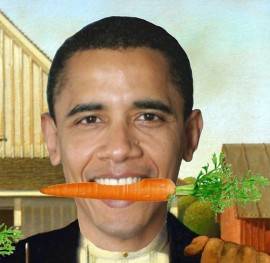 A few days ago the Obama administration announced its intentions to plant a garden smack in the middle of the White House lawn. During the campaign, advocates of organic gardening and the slow food movement pushed hard for this symbolic act, none more so than journalist and UC-Berkeley professor Michael Pollan.
A few days ago the Obama administration announced its intentions to plant a garden smack in the middle of the White House lawn. During the campaign, advocates of organic gardening and the slow food movement pushed hard for this symbolic act, none more so than journalist and UC-Berkeley professor Michael Pollan.
In Pollan’s open letter to the next president, whom he addresses as “farmer in chief,” Pollan wrote bluntly: “tear out five prime south-facing acres of the White House lawn and plant in their place an organic fruit and vegetable garden.” Appealing to the example of Eleanor Roosevelt’s World War II Victory Garden on the White House grounds, Pollan recognizes the hopeful and (oddly) controversial nature of his proposal. He reminds readers that the U. S. D. A. opposed Roosevelt’s garden because it “feared home gardening would hurt the American food industry.”
And that’s the crux of Pollan’s argument in nearly all his work, including his most recent book, In Defense of Food: An Eater’s Manifesto. After the horrors of The Omnivore’s Dilemma, which could put almost anyone off of eating for at least several minutes, Pollan’s new manifesto sets out a hopeful, practical agenda for those who have grown tired of what he calls “the food industry” and the “Nutritional Industrial Complex.”
Now eating seems a natural enough thing to do. Shop at the market; fill up your fridge; open the fridge; open your mouth. But Pollan contends that most of what we eat, and the ways that we eat, have taken us far from both nature and culture. In fact, “edible foodike substances” making grand nutritional claims comprise a large part of the American diet. We’ve moved from food to nutrition, from creatures that eat for sustenance and pleasure to consumers of calories as fuel.
As I continue to try and make my own path towards living attentively and responsibly in place,Pollan’s suggestions both unsettle and comfort. Of course it’s easier, always, to pull through a drive-through, especially when I commute several hours a week to teach in the Chicago suburbs. Of course my cabinets fill up with packaged foods that include “flavor packets,” whatever those are. But rather than wallow in the belly of my guilt, Pollan’s book offers a wealth of suggestions for shifting from consumption back to something like eating.
His simplest formulation: “Eat food. Not too much. Mostly plants.” Others: cook something at home, including chopping the stuff up yourself; grow and produce something rather than simply buying your food; at least have some idea where your food comes from. His more extended suggestions for shopping, storing, preparing, and sharing food don’t take on public policy. They take on habit, which I find more difficult to consider. I’d prefer not to consider that time and effort (and more money) will be required in order to understand how our bodies exist in relation to how our environment lives. “We are part of a food chain,” says Pollan, “and dependent for our health on its peoples and soils and integrity—on its health.”
Like all manifestoes, Pollan’s is a polemic—a sharpened argument meant to provoke. Thus, he dismisses out of hand some stuff that a good professor of agriculture would be able to complicate. But that complication connects precisely to Pollan’s case. He argues that the age of inexpensive, processed and plentiful food, supported by a transportation industry dependent on fossil fuels, will come to an end before we remember how to eat in ways cultivated by previous generations. He acknowledges that this whole endeavor will cost more, but believes that the savings, especially to the poorest of people, will appear in improved health and improved relationships to and within their communities.
And like the largest manifestoes, Pollen and others hope to transform American agriculture—reconnecting earth and culture (agri-culture) in a more intimate way. Echoing Wendell Berry, Pollan points out how the “carelessness” of “the industrial eater” results from our distance from what we eat, which allows us “to forget all that is at stake” for us and for the larger world. “Getting reacquainted with how food is grown and prepared,” he writes, “can provide a useful reminder.”
So as soon as I finish this bowl full of candy-coated malted-milk eggs, I intend to thaw out the homemade chicken soup I froze a few weeks ago. I intend to give up eating bananas and replace them with more locally grown fruits. I commit to joining the food co-op until I can plant my own herbs and tomatoes and until the Urbana Farmer’s Market opens for business on May 2.
Intentions, however, like symbols, can become pretty, empty candy bowls pretty fast. We’ll see if I am able to prepare and eat rather than crave and scarf my sustenance in the days ahead. We’ll find out as well if President Obama’s garden produces something more than arugula for gourmet state dinners.








